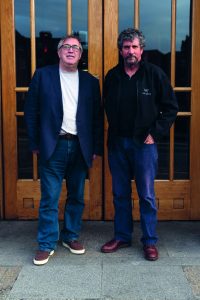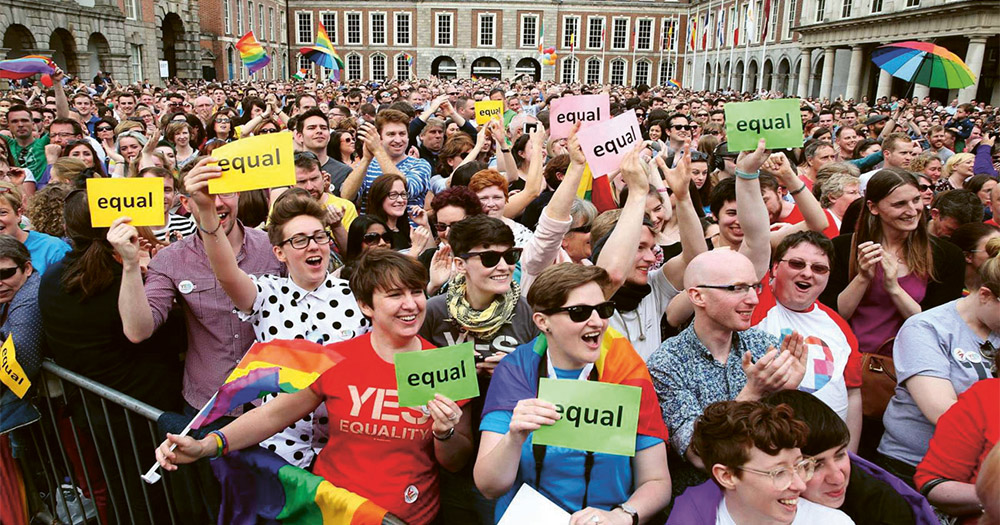A major theatrical adaptation of Charlie Bird’s book directed by Gerard Stembridge will be staged in the Olympia theatre. It’s a play that encapsulates the euphoria of that day in May, and the ordinary stories behind it. As part of the celebrations around the third anniversary, the drama-documentary is written by Colin Murphy based on the book of the same name by former RTÉ journalist, Charlie Bird, which recounts the personal stories of around the passing of the marriage referendum.
It’s the culmination of a personal project undertaken by Bird in the wake of the marriage referendum in 2015, which has already been turned into a successful photography exhibition. Inspired by the campaign and its result, Bird travelled around the country meeting and listening to individuals tell their deeply personal stories. In all he conducted 90 interviews over 150 hours, 50 of which made it into the original book. “The vast majority of people in the book are not well-known campaigners,” Bird says. “They’re what I call the ordinary people. It was the voices of those ordinary people that played a significant role in turning public opinion.”
Bird is the first to acknowledge that he’s an outsider looking in and says that the catalyst for the project was when he was asked to speak at a marriage equality event, where he heard the personal testimonies of lesbian and gay people. “I had worked in RTÉ for 38 years. A lot of my friends were gay. In one sense I never thought about the difficulties and the issues they might have been confronting. These powerful stories really struck me.”
It was a desire to document the stories behind the historic result that kickstarted the project “I remember going to the pub on the day of the referendum and asking this guy how he voted, and he looked at me and said, ‘Charlie, I voted No’. I met him two days later and he said, ‘I should have voted Yes. I’m convinced that more people will claim in 30 years time that they voted Yes. Nobody will admit that they voted No.”
Charged with bringing the book’s stage adaptation to life is director Gerard Stembridge, the co-creator of the iconic Scrap Saturday, writer of the groundbreaking 1996 play, The Gay Detective, and scriptwriter for films including, Ordinary Decent Criminal and Nora. Stembridge decided to direct the play after reading the script, which he says made him both laugh and cry.
Prior to the vote, Stembridge says that he would have been ambivalent around the issue of marriage equality, although he always knew that he would vote Yes. He, like many of his generation, had grown quite fond of his differences as a gay man, relishing in them even. He wasn’t too enamoured of Ireland having to go to the polls either. “I would have been of the opinion that I don’t have to ask anybody’s permission to be who I want to be or live as I want to live. But I’m happy to admit that my ambivalence was wrong, as it has been really worthwhile. The whole thing was wonderful and the play captures this.”
Stembridge says that the result made him feel immense pride in his country. “I felt the result radically expressed the country I thought I knew. It has been frustrating to live in Ireland and find your views always a minority view. You grow to love that almost. It was a shock to find that people are on your side and were happy to come out and say it.”
For him, it was young people who were one of the most moving elements of the campaign. “I have many harsh things to say about the younger generation in terms of mobile phones, Facebook and Twitter, but this was something which said they’re a wonderful generation. “I know of teenagers who set about talking to their grannies and went back again and again. Straight and gay, boys and girls, who just nibbled away. I get emotional thinking about it. It was hugely significant.”
The play itself will have just two performances and Stembridge and Bird urge everybody to make an effort to see it. “It will be very celebratory and people will regret it if they’re not there,” says Stembridge.

As a director, Stembridge says that it was essential to use actors as opposed to real people. “It had to be actors and really good actors. We have limited rehearsals, so there’s no way you could use people who didn’t have training. We have a cast of eight and the actors still play multiple roles.”
Stembridge says theatregoers can expect an emotional rollercoaster. “If they don’t laugh and cry, I will be astonished. The play tells the story of the campaign itself, lots of interesting stuff about the inside of the campaign. Rhythmically it goes back to the confessionals that Charlie got in his book, and the language is so wonderful. That’s what is so beautiful about it. I don’t want to say Colin [Murphy, the play’s writer] had an easy job, but he certainly didn’t have a job to create the voices of the characters because they were there on the page. And I am really looking forward to hearing the actors bring it to life.”
The authenticity of the voices is something which Bird fully agrees with. “It’s written by the people,” he says. “I brought it together as a project, but the people themselves are who we hear, and that’s what is so powerful about it.”
A Day In May runs for two nights beginning Sunday, June 24, coinciding with the 25th anniversary of the decriminalisation of homosexuality in Ireland. All profits from the play will be donated to Pieta House who will use it to help fund services for LGBT+ youth.
© 2018 GCN (Gay Community News). All rights reserved.

